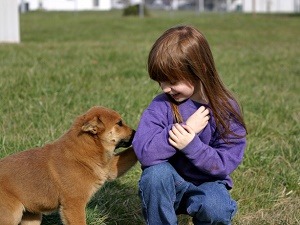
Dogs bite about 4.5 million people each year, reports the Centers for Disease Control and Prevention (CDC). Children aged five to nine are most likely to suffer dog bite injuries. To keep your family safe, make sure you read and share these eight child dog bite prevention tips.
Dog Bite Prevention Tips
The tips that apply to your situation depend on whether you are dealing with your own dog, a friend or neighbor’s dog, or an unfamiliar dog. We have included tips for all three.
- Carefully supervise your child around the family pet until you are confident that the child treats the dog appropriately. Dogs often bite children because children interact incorrectly or play too roughly. They might pull on a dog’s tail or ears, or hit or pat it too hard. A child might also tease a dog by taking away its toy or its food. If a dog feels sufficiently tormented, it might respond by biting.
- Supervise your child around the family pet until you are confident that the dog is not aggressive toward the child. Some dogs are simply not good with children. Some dogs are protective of a particular person within the family and will be aggressive toward others in the family.
- Consider using dog gates to block off areas indoors, to keep your dog and child separated at times when you cannot carefully supervise.
- Consider having the dog outdoors when the weather and conditions are appropriate, and your child indoors at times when you cannot carefully supervise.
- Teach your child how to interact with other people’s dogs. Show your child how to carefully and slowly approach a dog: avoid quick movements and loud noises, and allow the dog to sniff your hand before you try to pet it. This technique can help prevent bites.
- Remind your children that even friendly dogs can bite. Let them know that they should never be too aggressive with a dog, even if they know it.
- If you live in an area where dogs run off leash, consider fencing the yard or even a portion of it for your young children to have a safe play area. If that is not a possibility, consider keeping your children indoors at times when you cannot stay outside with them.
- If an unfamiliar dog approaches your child, make sure your child knows not to interact. Tell your child to say “no” firmly and to not scream or run away.
What can I do if a dog has bitten my child?
Unfortunately, you cannot prevent every dog bite. Make sure your child knows what to do during a dog attack (e.g., curl into a ball, cover your neck and ears) and that you know what to do after a dog bite.
Once you have ensured your child’s safety and gotten her the necessary medical attention, contact a Long Island dog bite lawyer from Goldstein & Bashner.
Call us today at 516-874-4362 to schedule a free consultation to discuss recovering compensation.
